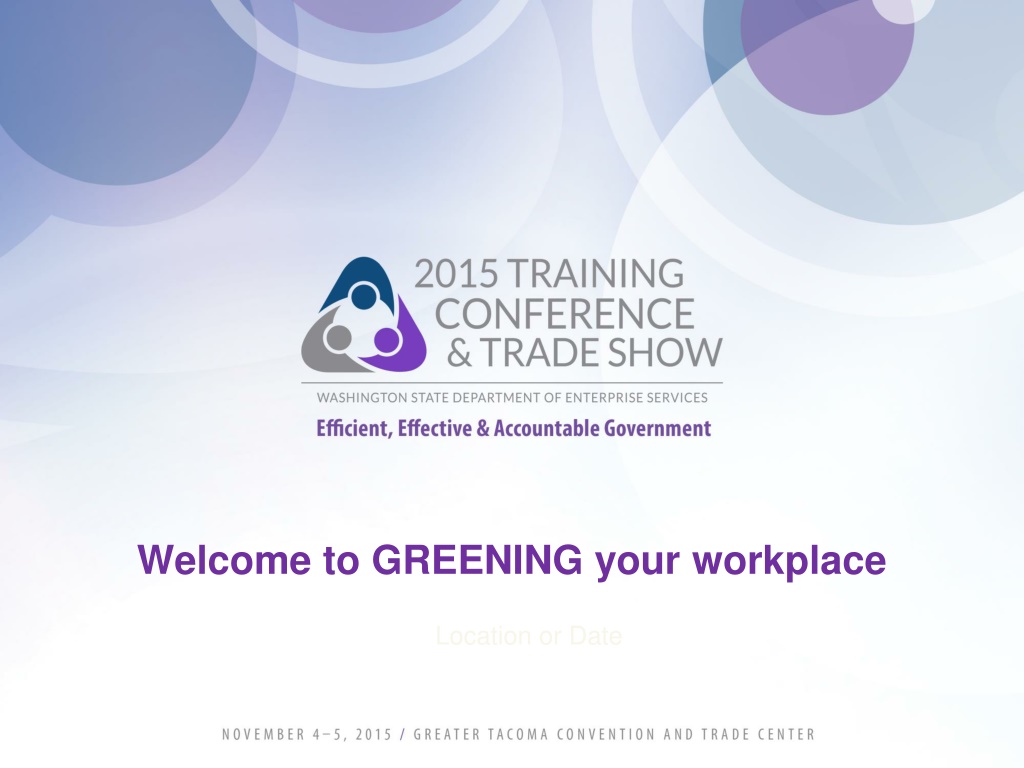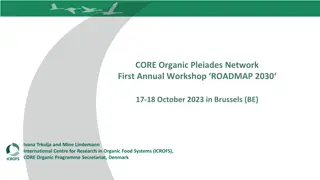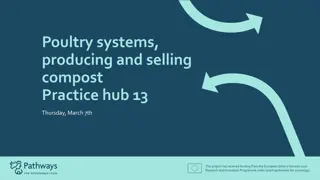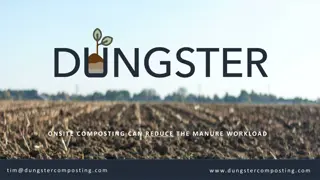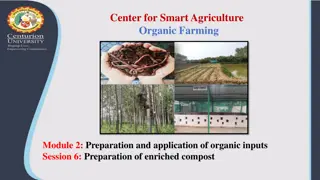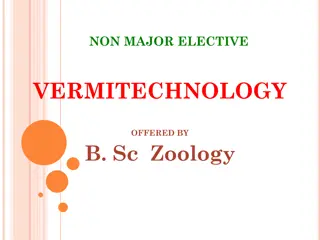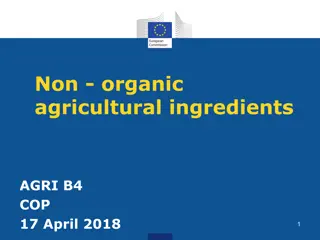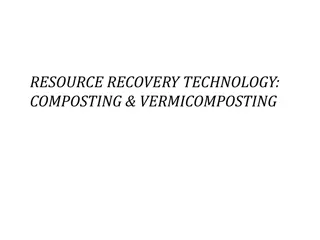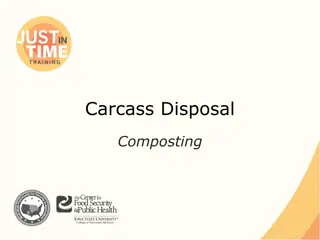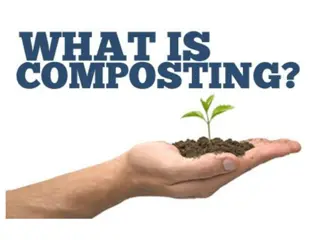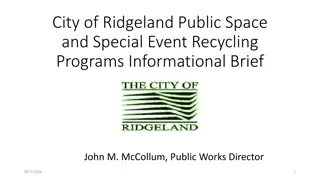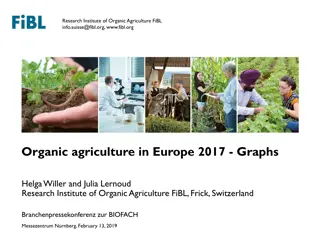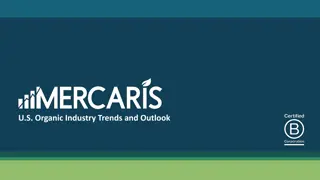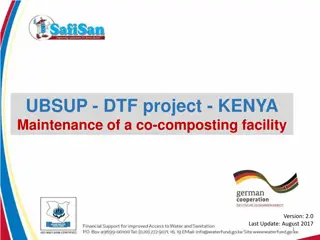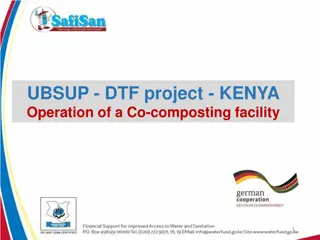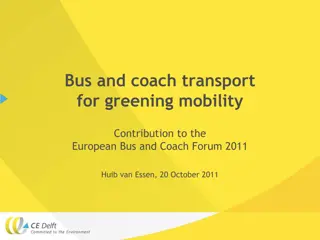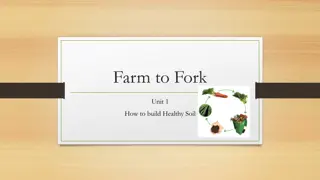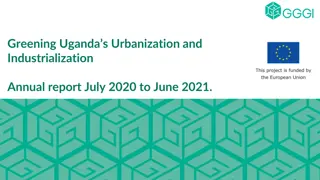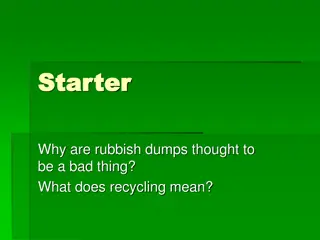Greening Your Workplace: Why and How to Implement Organic Composting and Recycling
There are compelling reasons to go green at your workplace, such as preserving natural resources, setting a positive example for employees, improving efficiency, and creating a healthier work environment. Discover the benefits of installing organic composting and recycling systems in your facility and how to get started with executive support and waste resource contractors. Make a positive impact on the environment while enhancing your workplace sustainability efforts.
Download Presentation

Please find below an Image/Link to download the presentation.
The content on the website is provided AS IS for your information and personal use only. It may not be sold, licensed, or shared on other websites without obtaining consent from the author. Download presentation by click this link. If you encounter any issues during the download, it is possible that the publisher has removed the file from their server.
E N D
Presentation Transcript
Welcome to GREENING your workplace Location or Date
Todays Topic WHY GREEN? INSTALLING ORGANIC COMPOSTING & RECYCLING IN YOUR FACILITY BUYING GREEN OFF MASTER CONTRACTS
Why Green? There are a number of important reasons to Go Green with your facility. The most significant being that preserving the world s natural resources is the responsibility of every individual both at work and at home. Additional reasons for your agency to Go Green include: Setting a positive example for employees which boosts morale and agency loyalty Improving efficiency and potentially lowering operating costs Providing a cleaner and healthier work environment
INSTALLING ORGANIC COMPOSTING & RECYCLING IN YOUR FACILITY Cory Noffsinger DES Facility Planning & Management November 5, 2015
Whats in our trash? About 40-50% is recyclable material Aluminum & tin cans Paper/cardboard/corrugated paper board Plastics of all kinds Batteries About 25-30% is organic compost Food Food contaminated paper Pizza boxes Coffee grounds/filter Unwaxed paper plates, napkins About 20-35% is trash Old binders, pens, plastic packaging, paper clips etc. Restroom & cleaning trash Building maintenance Electronic waste CDs/DVDs Chargers Surplus items Desk furniture in/out boxes, name plates etc.
Organic Composting Getting Started Executive Support Gov. Inslee Results WA Goal 3 Sustainable Energy & a Clean Environment Leased or owned facility? May need to discuss service with waste resources contractor Leased facility may need to have the lease altered to support commercial compost hauling Local haulers have restrictions on accepted material and collection bags Local haulers may have canned programs with hauling plans, signage & container options
Organic Composting Getting Started Executive Support Gov. Inslee Results WA Goal 3 Sustainable Energy & a Clean Environment Leased or owned facility? May need to discuss service with waste resources contractor Leased facility may need to have the lease altered to support commercial compost hauling Local haulers have restrictions on accepted material and collection bags Local haulers may have canned programs with hauling plans, signage & container options
Communication Stakeholder buy in Communicate with all staff Communicate about participation Is it voluntary? Help people understand that if they aren t sure to err on the side of caution and place in trash Lots of signage
Installing a Recycle Program Getting Started Executive Support Gov. Inslee Results WA Goal 3 Sustainable Energy & a Clean Environment Leased or owned facility? May need to discuss service with waste resources contractor Leased facility may need to have the lease altered to support commercial recycle hauling Local haulers have restrictions on accepted material and collection bags Local haulers may have canned programs with hauling plans, signage & container options
Communication Stakeholder buy in Communicate with all staff Communicate about participation Is it voluntary? Help people understand that if they aren t sure to err on the side of caution and place in trash Lots of signage
Recycle Materials Easily Recyclable Materials Paper Plastic Bottles Dairy containers (rinsed out) Plastic around large deliveries Metal Aluminum & Tin cans Glass
Less Easily Recycled Materials Batteries Work with a vendor Fluorescent light tubes Return to place of purchase Packaging Material Styrofoam
Closing Thank you Q&A
GREEN PRODUCTS ON MASTER CONTRACTS Kimberly Ward Contracts, Procurement, & Risk Management November 5, 2015
What is Green? Energy efficient, durable and often have low maintenance requirements. Free of Ozone depleting chemicals, toxic compounds and don t produce toxic by-products. Often made of recycled materials or content or from renewable and sustainable sources. Obtained from local manufacturers or resources. Biodegradable or easily reused either in part or as a whole.
How do you know it is Green? Energy Star A labeling program for energy efficient homes, building products, electronics and appliances. ENERGY STAR is a joint program of the U.S. Environmental Protection Agency and the U.S. Department of Energy helping protect the environment through energy efficient products and practices. The Green Seal Green Seal Certification ensures that a product meets rigorous, science-based leadership standards. It is a lifecycle assessment based labeling program for building products, green operations and maintenance procedures. A green seal can be found on anything from a coffee filter to a hotel. Forest Stewardship Council A certification program for wood products that come from forests that are managed in an environmentally responsible, socially beneficial and economical viable way. They are a non-profit organization, not affiliated with the government, working to promote responsible management of the world s forests since 1993. Leadership in Energy and Environmental Design (LEED) The LEED certification was created by the U.S. Green Building Council in 2000, it in an internationally recognized standard for green building and design. The rating system works off 5 categories and is associated to both business and residential buildings. LEED focuses on whole building sustainability which can be used by diverse professionals and government agencies. USDA Organic Certification USDA certified organic foods are grown and processed according to federal guidelines addressing, among many factors, soil quality, animal raising practices, pest and weed control, and use of additives. Organic producers rely on natural substances and physical, mechanical, or biologically based farming methods to the fullest extent possible. WaterSense: The WaterSense label allows consumers to recognize products and programs that save water without sacrificing performance or quality.
Green Products on Master Contracts How do I find Green Products on Master Contracts? Look for the green tree on the top of the project page Select the Contracts with green or recycled content in the drop down for the Contract Search Tool
Closing Thank you Q&A
